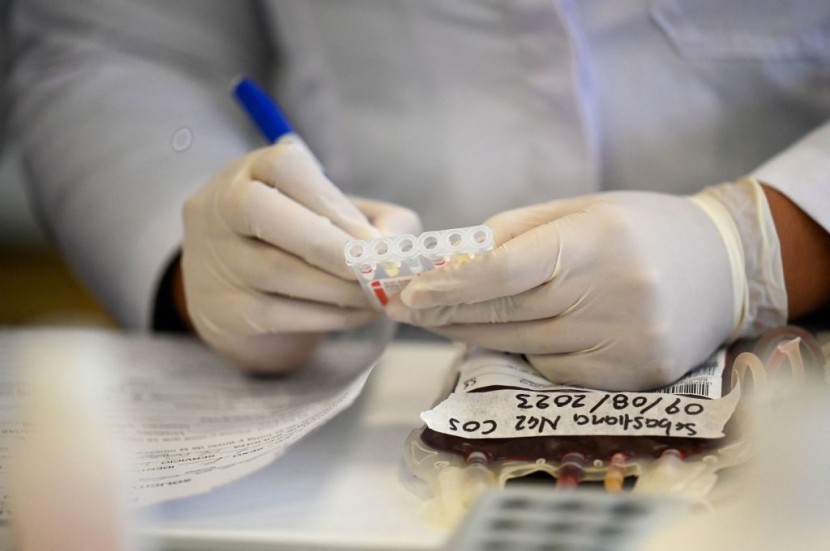
(Photo: by JOHAN ORDONEZ/AFP via Getty Images) A laboratory technician checks a blood sample at the National Hospital of Chimaltenango, built with a donation from Taiwan and whose construction was involved in a case of corruption for the anomalous purchase of its equipment, in Chimaltenango, Guatemala on August 9, 2023.
It will be a few more years before blood tests for Alzheimer's are used routinely to diagnose the debilitating disease and determine its prevalence, according to medical professionals and business executives.
Initial blood tests to rule out Alzheimer's are likely to be performed, with positive results highlighting the need for more sophisticated diagnostics.
A number of blood tests for Alzheimer's are being developed, and one is even now being sold to consumers, but none have been proven to be reliable, formally approved by regulators, or paid for by insurance companies, according to Reuters. Some are being used to screen people who sign up for Alzheimer's disease treatment research trials.
Leqembi
Currently, individuals who could benefit from Leqembi, a new Alzheimer's medication from Eisai and Biogen, must have cognitive testing, a cerebrospinal fluid (CSF) test that necessitates an invasive lumbar puncture, or an expensive PET brain scan that may not be covered by health insurance, in order to identify those changes.
CSF and PET testing, even when covered, might be difficult to obtain in some areas of the nation.
For years, scientists have been developing blood tests for Alzheimer's that can replace this diagnostic equipment. Which blood proteins, or biomarkers, indicate the existence of amyloid and tau in the brain, however, is still up for debate.
They add that additional research is necessary to comprehend how race, underlying medical disorders, and other factors relate to these biomarkers.
Blood testing is now more crucial than ever since the FDA authorized Leqembi in July. A comparable medication from Eli Lilly, donanemab, is being reviewed at the moment.
Amyloid by itself is not a reliable indicator of Alzheimer's disease, according to Dr. Sarah Kremen, director of the neurobehavioral program at Cedars-Sinai Medical Center in Los Angeles. This is because many people who collect amyloid protein deposits in their brains as they age do not go on to develop dementia.
Read also: New Alzheimer's Drug Leqembi Approved in Japan
Blood Tests: The Gold Standard for Diagnosing Alzheimer's Soon?
The gold standard for diagnosing Alzheimer's will soon be blood tests that evaluate the appropriate combination of biomarkers.
A blood test with a stated price of $626 that Labcorp claims detects indicators for amyloid, tau, and neurodegeneration became available to doctors on Wednesday.
The first direct-to-consumer blood test for Alzheimer's, which costs $399 and looks for aberrant amyloid levels, was introduced by Quest Diagnostics in July. Its accuracy is not known from published data.
For those who do not have risk factors for or symptoms of Alzheimer's disease, Cedars and other neurology institutions took the rare step of issuing strongly worded warnings regarding such consumer tests, stating that they should only be used in conjunction with medical advice.
The goal of Eisai's partnership with C2N Diagnostics is to create data that will facilitate the implementation of blood-based Alzheimer's diagnostics.
According to Michael Irizarry, director of clinical research at Eisai's neurology division, the switch to blood-based Alzheimer's diagnosis will take place over the course of the following two years.
C2N, which has published its findings and presented its data at scientific meetings, has started selling an upgraded, $1,450 blood test that evaluates amyloid and tau.
In addition to collaborating with Roche to create a test that measures blood levels of a distinct tau protein and a gene linked to an increased risk of Alzheimer's disease, Eli Lilly is working with Quanterix on an experimental tau biomarker blood test.
In 2025, according to Roche Diagnostics executive Bruce Jordan, the business hopes to receive the findings of a sizable study, at which point it will apply for U.S. clearance of its Elecsys Amyloid Plasma Panel.
As the most prevalent but not exclusive cause of dementia, accurate blood tests are expected to aid in determining which dementia patients genuinely have Alzheimer's.
Related article: New Study Shows Connection Between Cognitive Deterioration and Constipation
© 2026 HNGN, All rights reserved. Do not reproduce without permission.








